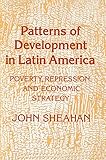Patterns of Development in Latin America : Poverty, Repression, and Economic Strategy / John Sheahan.
Material type: TextPublisher: Princeton, NJ : Princeton University Press, [2022]Copyright date: ©1988Description: 1 online resource (410 p.)Content type:
TextPublisher: Princeton, NJ : Princeton University Press, [2022]Copyright date: ©1988Description: 1 online resource (410 p.)Content type: - 9780691201313
- Political rights -- Latin America
- Poor -- Latin America
- SOCIAL SCIENCE / Anthropology / General
- Alliance for Progress
- Bosch, Juan
- Carter administration
- Catholic Church
- Christian Democrats (Chile)
- Dominican Republic
- Ecuador
- El Salvador
- Frei, Eduardo
- Frondizi, Arturo
- Goulart, João
- Haiti
- Honduras
- Inter-American Foundation
- Johnson administration
- Kennedy administration
- López Portilló, José
- National Front (Colombia)
- Panama
- Reagan administration
- Soviet Union
- Unidad Popular
- Velasco government
- Venezuela
- agriculture and rural labor
- autonomy, national
- balance of payments, foreign exchange
- bureaucratic-authoritarian regimes
- capital flight
- child and infant mortality
- debt and external credit
- economic growth
- employment, labor markets
- food prices and supply
- guerrilla movements
- human rights
- incomes policy
- industrialization
- inequality
- inflation
- migration: international
- monetarism
- populism, populists
- poverty
- public enterprise
- regime types
- rural-urban conflicts
- state farms
- structuralism
- taxation
- technology
- terms of trade
- 338.98 19
- HC125
- HC125
- online - DeGruyter
| Item type | Current library | Call number | URL | Status | Notes | Barcode | |
|---|---|---|---|---|---|---|---|
 eBook
eBook
|
Biblioteca "Angelicum" Pont. Univ. S.Tommaso d'Aquino Nuvola online | online - DeGruyter (Browse shelf(Opens below)) | Online access | Not for loan (Accesso limitato) | Accesso per gli utenti autorizzati / Access for authorized users | (dgr)9780691201313 |
Frontmatter -- CONTENTS -- TABLES AND FIGURES -- PREFACE -- PART I PERSISTENT ISSUES -- ONE. WAYS OF LOOKING -- TWO. POVERTY -- THREE. EMPLOYMENT AND EARNINGS -- FOUR. EXTERNAL TRADE, INDUSTRIALIZATION, AND ECONOMIC GROWTH -- FIVE. INFLATION, EXTERNAL DEFICITS, AND IMF STABILIZATION PROGRAMS -- SIX. OWNERSHIP I: LAND -- SEVEN. OWNERSHIP II: MULTINATIONALS, PUBLIC ENTERPRISE, AND DEPENDENCY -- PART II NATIONAL PATTERNS OF RESPONSE -- EIGHT. EARLY INDUSTRIALIZATION AND VIOLENT REACTION: ARGENTINA AND BRAZIL -- NINE. REFORMISM, MARXISM, AND MILITANT MONETARISM: CHILE -- TEN. TWO KINDS OF REVOLUTIONARY ALTERNATIVE: CUBA, AND PERU UNDER VELASCO -- ELEVEN. MIDDLE-ROAD MARKET ECONOMIES: COLOMBIA, COSTA RICA, AND MEXICO -- PART III POSSIBILITIES AND QUESTIONS -- TWELVE. ECONOMIC STRATEGIES, SOCIAL STRAINS, AND POLITICAL REPRESSION -- THIRTEEN. IS IT POSSIBLE FOR THE UNITED STATES TO PLAY A CONSTRUCTIVE ROLE? -- FOURTEEN. FROM CONCLUSIONS TO ONGOING QUESTIONS -- REFERENCES -- INDEX
restricted access online access with authorization star
http://purl.org/coar/access_right/c_16ec
In this major work an economist with long experience as an advisor in developing countries explores the conflict between market forces and political reform that has led straight into Latin America's most serious problems. John Sheahan addresses three central concerns: the persistence of poverty in Latin American countries despite rising national incomes, the connection between economic troubles and political repression, and the relationships between Latin America and the rest of the world in trade and finance, as well as overall dependence. His comprehensive explanation of why many Latin Americans identify open political systems with frustration and economic breakdown will interest not only economists but also a broad range of other social scientists. This is "political economy" in the classical sense of the word, establishing a clear connection between the political and economic realities of Latin America.
Mode of access: Internet via World Wide Web.
In English.
Description based on online resource; title from PDF title page (publisher's Web site, viewed 29. Jul 2022)


